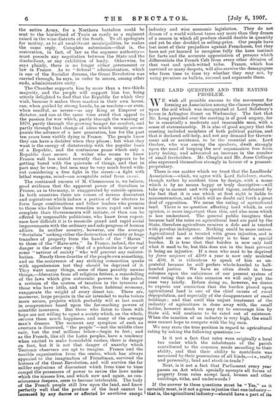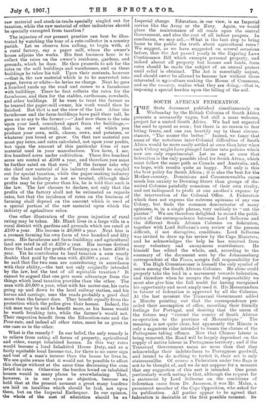THE LAND QUESTION AND THE RATING PROBLEM.
WE wish all possible success to the movement for forming an Association among the classes dependent upon the soil which was inaugurated at Lord Salisbury's house in Arlington Street on Wednesday. The fact that Mr. Long presided over the meeting is of good augury, for he is essentially a moderate and reasonable man, with a seam of statesmanship. It is also of good augury that the meeting included members of both political parties, and, that it declared self-help, and not any demand for Govern- ment aid or assistance, to be the essential aim. Lord Onslow, who was among the speakers, dwelt strongly upon the need of keeping the new organisation free from party feeling, and advocated an increase in the number of small freeholders. Mr. Chaplin and Mr. Jesse Collings also expressed themselves strongly in favour of a peasant- proprietary.
There is one matter which we trust that the Landlords' Association—which, we agree with Lord Salisbury, starts, though rather by accident than by design, with a name which is by no means happy or truly descriptive—will take up in earnest and with special vigour, undeterred by the fact that it is one which at first sight is liable to misconstruction, and which will no doubt call forth a great deal of opposition. We mean the rating of agricultural land. There is no question affecting land which, in our opinion, is more important than this, and also none which is less understood. The general public imagines that because half the rates on agricultural land are paid by the State, therefore agriculture receives a dole and is treated with peculiar indulgence. Nothing could be more untrue. Agricultural land is treated with gross injustice, and is singled out as no other industry is to bear a special burden. It is true that that burden is now only half what it used to be, but this does not in the least prevent it being an injustice. If a man who used to be deprived by force majeure of £100 a year is now only mulcted in £50, it is ridiculous to speak of him as un- grateful because lie still prefers whole-handed to half- handed justice. We have so often dwelt in these columns upon the unfairness of our present system of rural rating that on this occasion we will only put the case very briefly. Before doing so, however, we desire to express our conviction that the burden placed upon agricultural land is one of the chief causes of rural depopulation, and especially of the disappearance of small holdings ; and that until this unjust treatment of the industry of agriculture is done away with, the small holder, however much we may try to encourage him by State aid, will continue to be rated out of existence. When the taxation of an industry is very high, the small man cannot hope to compete with the big man.
We may state the true position in regard to agricultural rating by asking the following questions :— Is it not a fact that rates were originally a local tax under which the inhabitants of the parish contributed to the common needs according to their ability, and that their ability to contribute was measured by their possessions of all kinds,—i.e., realty and personalty, land and stock-in-trade ?
Next, is it not a fact that Parliament every year passes an Act which specially exempts all forms of property from rates except land, houses and other buildings, tithe, and underwoods ?
If the answer to these questions must be "Yes," as it certainly must, is it not a gross injustice that one industry— that is, the agricultural industry—should have a part of its raw material and stock-in-trade specially singled out for taxation, while the raw material of other industries should be specially exempted from taxation ?
The injustice of our present practice can best be illus- trated by watching the tour of a rate-collector in a country parish. Let us observe him calling, to begin with, at a rural factory, say a paper mill, where the owner's house adjoins the works. His first business here is to collect the rates on the owner's residence, gardens, and grounds, which he does. He then proceeds to ask for the rates on the mill buildings and warehouses, and on these buildings he takes his toll'. Upon their contents, however —that is, the raw material which is to be converted into paper, brown or white—he levies no charge. Next he goes a hundred yards up the road and comes to a farmhouse with buildings. There he first collects the rates for the farmhouse, and then for the stables, carthouses, cowsheds, and other buildings. If he were to treat the farmer as he treated the paper-mill owner, his work would then be finished. But that is not the view of the law. After the farmhouse and the farm-buildings have paid their toll, he goes on to say to the farmer :—"And now there is the rate upon your land, considered apart from the buildings,— upon the raw material, that is, out of which you produce your corn, milk, cheese, cows, and potatoes, or whatever you breed or grow. On that raw material you must pay rates, and rates calculated, not upon your profits, but upon the amount of this particular form of raw material used in your manufacture. You have, I see, five hundred acres under cultivation. These five hundred acres are rented at £500 a year, and therefore you must be further rated on that sum." If the farmer asks why the chief raw material of his industry should be singled out for special taxation, while the paper-making industry or the boot industry is not so treated, although their profits may be far greater than his, he is told that such is the law. The law chooses to declare, not only that the profits of the factory shall not be estimated as regards rates, but that the incidence of rates on the business of farming shall depend on the amount which is used of a special portion of the raw material upon which the industry of agriculture relies.
One other illustration of the gross injustice of rural rating may be taken. Mr. Blank lives in a large villa in a rural district with gardens and grounds which are rated at £100 a year. His income is £6,000 a year. Next him is a yeoman farming his own farm of two hundred and fifty acres. His farmhouse and farm-buildings and agricultural land are rated in all at £250 a year. His income derived from the land and the profits of farming are a bare .2300 a year. Yet he contributes to local taxation a sum nearly double that paid by the man with £6,000 a year. Can it be said that the two men are contributing in accordance with their ability,—the test not only originally intended by the law, but the test of all equitable taxation ? It cannot be argued that one gets more advantage from the things which local taxation provides than the other. The man with £6,000 a year, what with his motor-car, his carts going up and down to the local railway station, and his horses and carriage, uses the roads probably a good deal more than the farmer does. They benefit equally from the protection which the police give their homes. Indeed, the rich man tnay be said to benefit more, as his house would be worth breaking into, while the farmer's would not. Their respective benefit from the Education-rate and the Poor-rate, and indeed all other rates, must be as great in one case as in the other.
What is the remedy ? In our belief, the only remedy is to relieve from rating all forms of property, agricultural and other, except inhabited houses. In this way rates would become a local Inhabited House Duty, and so a fairly equitable local Income-tax, for there is no surer sign and test of a man's income than the house he lives in. We are quite aware that it would not be possible to effect this change without at the same time decreasing the sum levied in rates. Otherwise the burden levied on inhabited houses would in many places be overwhelming. That, however, is in our eyes no objection, because we hold that at the present moment a great many burdens are laid on localities which should be laid, not upon them, but on the Imperial Exchequer. In our opinion, the whole of the cost of education should be an Imperial charge. Education, in our view, is an Imperial service like the Army or the Navy. Again, we would place the maintenance of all roads upon the central Government, and also the cost of all indoor paupers. In conclusion, we may ask,—What is the best step to bring home to the public the truth about agricultural rates ? We suggest, as we have suggested on several occasions before, that the Act passed yearly in the Expiring Laws Continuance Bill which exempts personal property, and indeed almost all property but houses and lands, from rates should be made the subject of an annual protest until relief is obtained. The Act is essentially unjust, and should never be allowed to become law without those interested in agriculture making the House of Commons, and so the country, realise what they are doing,—that is, imposing a special burden upon the tilling of the soil.















































 Previous page
Previous page